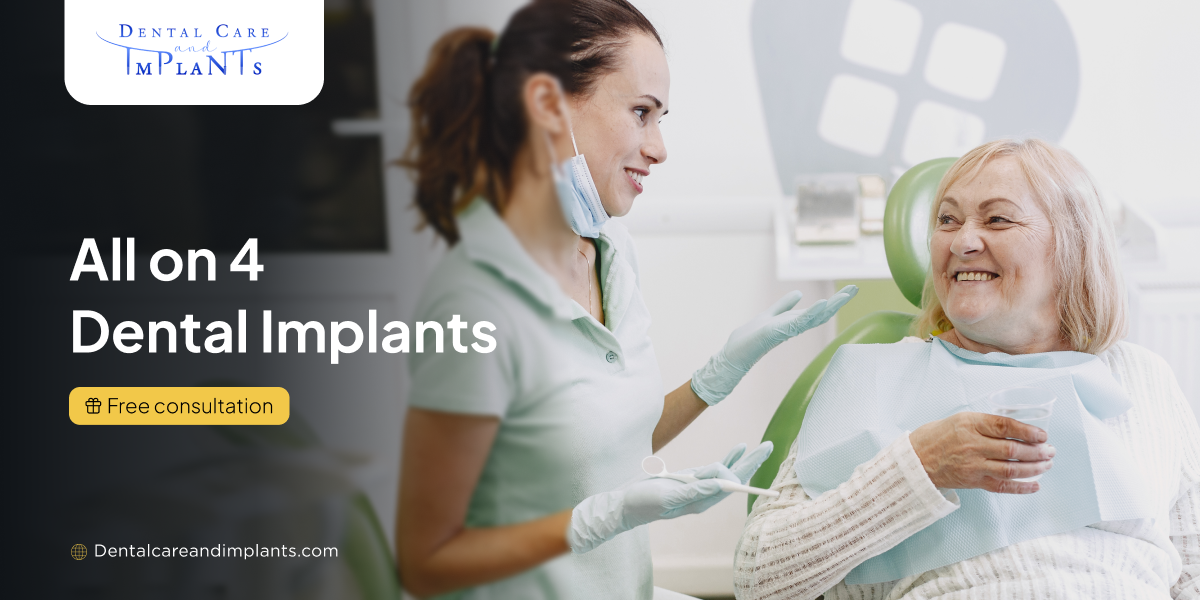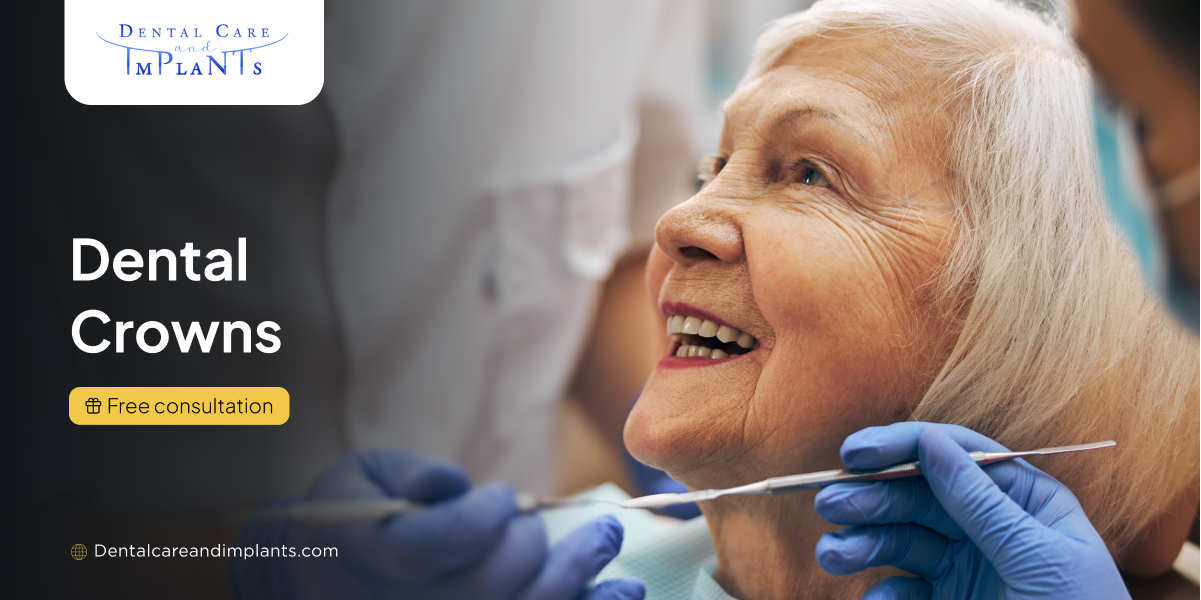Dental Blog - Houston, TX
Tips, Facts, And The
Latest In Dentistry

What Impacts Full Mouth Dental Implants Healing Time? Key Factors Explained
Posted in Uncategorized
Posted on May 7, 2025 by Kazim

Is full mouth dental implants healing time concerning you? You’re not overthinking or being unnecessarily worried; it just shows you’re a conscious patient who wants a smooth, complications-free restorative experience.
Full mouth dental implants are everything an edentulous patient could ask for — they’re the closest thing to getting your natural teeth back. These permanent artificial teeth are fixed to the jaw and have a rock solid bite strength that allows you to smile and eat confidently! But there’s one thing that people often underestimate: these implants, though easy and quick to place, have a considerable healing window.
The healing itself isn’t the catch here ; the real issue is the ‘variation’ in healing times — it can be short, moderate or linger on indefinitely, depending on quite a few factors.
Educating yourself now (rather than later) about what impacts implant healing will help you gauge a predictable healing time for your specific case. It’ll also help you approach the treatment with a certain proactiveness so you may tackle any problems before they get serious. This will turn your concern into mental readiness and will even help you stay proactive about avoiding any potential issues.
Let’s explore this subject further!
Full Mouth Implants: What They Are And When Do They Typically Heal?
Full mouth dental implants are a comprehensive restorative treatment meant for people who have lost all of their teeth in one or both of the dental arches (if it’s a single arch then the treatment is referred to as full arch dental care).
4-8 dental implants (artificial tooth roots) are placed per toothless arch to support a custom-made denture (a full set of artificial teeth). The implants — which are small cylindrical screws — are ‘surgically’ placed into the edentulous jawbone, after which they fuse with the jaw and become a permanent part of it (just like tooth roots).
These fake roots then anchor a full set of artificial teeth to your jaw, restoring the toothless arch to perfection. Since it’s a surgical procedure, it’s inevitably followed by healing, which happens in two overlapping phases:
Initial Soft Tissue Healing:
The gums and surrounding soft tissues heal from the obvious surgical trauma, taking around 1-2 weeks for complete healing. During these two weeks, the initially swollen and tender gums gradually plumpen up. The swelling and pain subside, and the sutures are removed. The gums eventually seal around the surgical sites.
Osseointegration And Bone Remodeling
This is the process where the freshly placed implants fuse with the bone. Microscopic bone cells grow around (and onto) the implant surface, locking it in like a natural tooth root.
This process kicks off right after implant insertion (so it overlaps with the initial healing) and may take 3-6 months to complete. It’s not a painful process unlike initial soft tissue healing, but is considered an integral part of the overall healing process.
So, looking at the above information, it’s safe to say that a typical implant (i.e. an average, straightforward implant case) would require anywhere from 3-6 months to reach healing!
Factors That Impact Healing
We just explored the typical healing duration for full mouth implants, which is pretty bearable (waiting for 3-6 months doesn’t sound like a big deal when the ultimate fruit is worth it).
But here’s the catch: not every implant case is as straightforward as expected, and even a textbook‑perfect surgery can run into surprise hurdles. Besides, every mouth is unique. Your overall health, aftercare and several other variables influence how quickly your tissues settle and your implants fuse.Understanding these variables before you begin lets you tackle problems early and keep healing on schedule. The key factors are:
Bone Quality/Volume
Your bone quality is the first and foremost determinant of how quick or slow your healing will be.
Think of bone like soil. Just as rich/dense soil lets roots grab quickly, a sturdy and thick jawbone will let implants fuse quickly, making it eligible for even ‘same day’ implants (where the denture is placed right after implant surgery due to adequate initial stability).
People who have had significant jawbone loss or whose jawbone has thinned due to years of untreated tooth loss may have to get jawbone grafting done. This will add an extra surgical layer and extend the total treatment timeline by 4-6 months!
Surgical Technique
Modern implant surgery is carried out through 3D printed (computer-guided) stents that position implants through tiny punch incisions. It causes minimal soft tissue trauma, hence less swelling and faster gum healing.
Traditional surgery, however, uses an open flap approach (which exposes the underlying bone rather than just cutting through the gums). This approach is sometimes necessary, but it adds a week or two of tenderness in the initial healing timeline.
Implant Design
Implant manufacturers are determined to make implants more fusion-friendly. A technique they’ve lately incorporated for this purpose is that they microetch the implant surfaces or coat phosphate nanocrystals, making the surface super friendly to osteoblasts (bone building cells).
The result? The implants show faster integration (as much as 30% faster compared to older designs) and reduced healing time. You can opt for these implants for quicker healing.
Health And Medications
It’s a well known fact that systemic conditions (such as diabetes and osteoporosis) impede implant healing, but it’s not only because of the high inflammation levels associated with these conditions.
High glucose (hbA1c) in diabetes poses hurdles in white blood cells and collagen cross-linking, which is essential for bone remodeling. The drugs used to treat osteoporosis (bisphosphonates) also suppress bone turnover, so it also disturbs osseointegration.
So, you can expect definite delays in your healing if you happen to have any such condition and you’re not managing them as advised by your surgeon.
Smoking And Drinking
Smoking and drinking are two major deterrents in implant healing. The nicotine in cigarettes (even in e-cigarettes) has devastating effects on your blood circulation, shrinking capillaries for hours after each puff and restricting oxygen supply to the surgical site. Heavy alcohol consumption also works on similar lines.
This explains why you’re advised to quit smoking at least 2 weeks before surgery and stay smoke free for at least 4-8 weeks after the surgery. Major delays in healing (and even implant failure) can occur if you fail to follow these guidelines.
Other General Factors
While the above factors have an indispensable influence on your implant healing, we should also take into account other obvious (but with equally important influence) factors, such as:
- Gentle but diligent post surgery care is extremely important for faster recovery. Use a soft bristled toothbrush, a nonabrasive toothpaste and make sure you’re water flossing daily during the healing phase. Get professional cleanings every 3 months.
- The patient’s diet. Know that your body can’t heal itself without having the raw materials (i.e. the nutrients) necessary for it. Make sure you have enough protein, vitamin D, vitamin C and calcium in your diet.
- Age influences healing, but not so much if you have your health in check. A 70 year old, fit person with good metabolic health can heal just as fast as a 40 year old.
Conclusion
Studying the above factors can give you important insights into your probable full time dental implants healing timeline, but only your dentist can confirm the precise healing duration for your case. Make sure you have a detailed discussion with your dentist on this subject (and bring up the factors we mentioned during the discussion) so you may have a clear roadmap to follow.
Still have questions? Schedule a FREE consultation with Dental Care And Implants. We have a team of implant experts ready to answer all your queries. Talk to us and pave your way to a revitalized smile!





